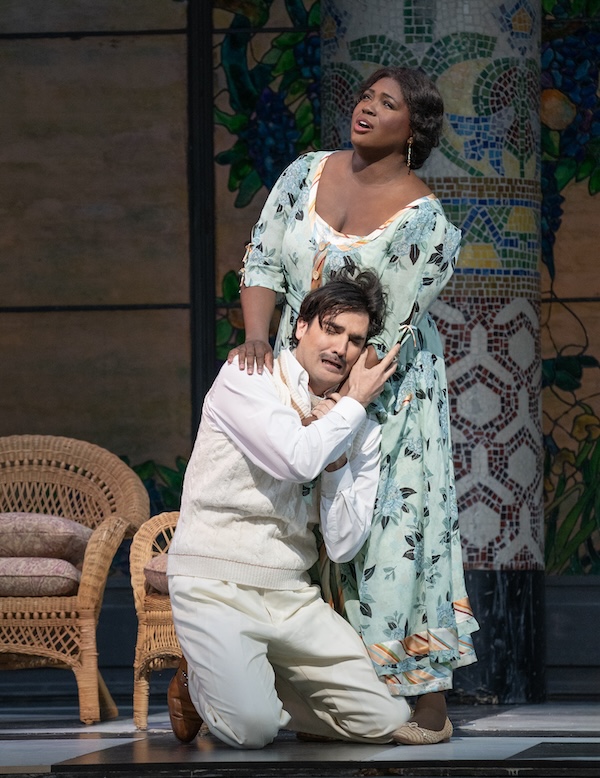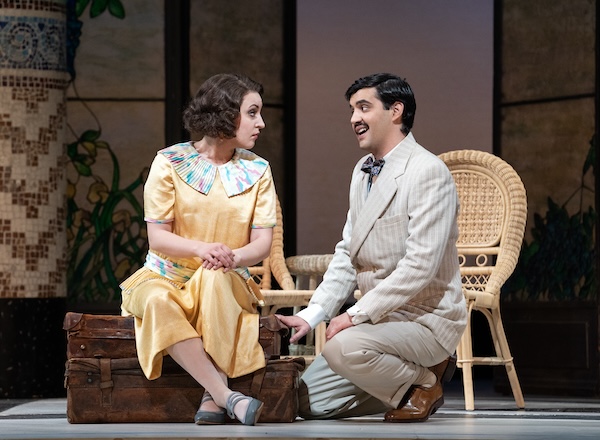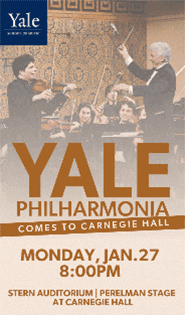With an elegant “Rondine,” Met revives a not-great Puccini opera with great music

Puccini is the mainstay of most Metropolitan Opera seasons, so it’s strange to think of one of his works as a rarity. But that’s the case with La Rondine, which first premiered at the Met in 1928, was revived in 1936, and wasn’t staged again until 2008. The most compelling explanation for this intermittent presence is that it’s not a great opera, even though it does have great music in it—especially for the lead soprano in the role of Magda, which makes it a star vehicle.
That star Tuesday night, when the Met’s revival of Nicolas Joël’s stylish Art Deco and Tiffany glass production opened, was Angel Blue. The role demands bravura singing, not in the manner of speed and articulation, but range and strength. The most important music, like her Act I aria “Chi il bel sogno di Doretta” and the absolute final notes of the opera in “Ma come puoi lasciarmi,” have sustained notes in the upper register that need a full, rounded tone at both forte and pianissimo. Blue has a gorgeous, expressive tone and tremendous projection, which would seem to make her the ideal singer for which to revive the staging.
And for the most part, she was, as the centerpiece of a performance that had a pleasing combination of music-making, stage production and pace. None of this could elevate La Rondine into a top-tier work. The opera may be Puccini’s most colorful score, full of brilliant orchestration and some of his most sensuous chromaticism, yet the story is both too sentimental and too light. It follows Magda falling in love with a man, all through one of Puccini’s big cafe scenes, and then comes to an abrupt, ungainly, and unfeeling halt in the truncated third act. Still, from moment to moment there is plenty of exceptional music to enjoy.
This revival also features three debuts in key roles: tenors Bekhzod Davronov as the poet Prunier and Jonathan Tetelman as Ruggero, Magda’s love interest; and soprano Emily Pogorelc as Lisette, Magda’s on-again/off-again maid and object of Prunier’s desire. The cast was filled out by always reliable bass-baritone Alfred Walker in the small but essential role of Rambaldo, the banker who keeps Magda as his mistress. Speranza Scappucci conducted.
Davronov and Tetelman both made fine Puccini tenors, although each had a drawback in their singing. For Davronov, it was projection—his smooth, rounded tone was warm, and his phrasing elegant, but he was often swamped by the orchestra and especially by Blue. That’s simply the soprano’s weight and fullness of her tone.
Tetelman had easy, strong projection, and an excellent sense of what Puccini wants—his “Dimmi che vuoi seguirmi” in Act III was precise and heartfelt—but the warm grain in his voice is a little thin and not completely pliable. In a way, the men did fit the characters, the poet smooth and self-regarding, the lover duly earnest.

Pogorelc was excellent. The lighter quality of her voice was a good contrast with Blue and she handled Lisette’s own high register leaps with ease. She also seemed to be enjoying herself more on stage than anyone else, projecting a sense of elan one usually finds in musical theater, while the rest of the singers were very much concentrating on their arias and ensemble passages. Pogorelc’s Lisette was the most characterful performance of the night.
As the score demands, it all came down to Blue. Her singing wasn’t flawless, her high Cs in the opening act were not as open as the rest of her range, and the final sustained A-flat wavered a little at the end. But her voice was beautiful and commanding all night, and even more there was the sense of meaning in every note. Even as the characters’ actions may seem silly, Blue’s singing made them palpable in the moment.
Scappucci kept an excellent flow all evening, and every moment had life and forward-moving energy. That the orchestral playing got off to an odd start was actually a sign of how enjoyable the playing was: through about the first half of Act I, there was some mis-coordination between orchestra and singers. They were together, sliding around between the bar lines and through the phrases as one, and having a good time doing it. It was rather charming. Things pulled together quickly, and the musicians seemed to be relishing every gorgeous detail in the music—there were plenty of them Tuesday night.
La Rondine continues through April 20. metopera.org

